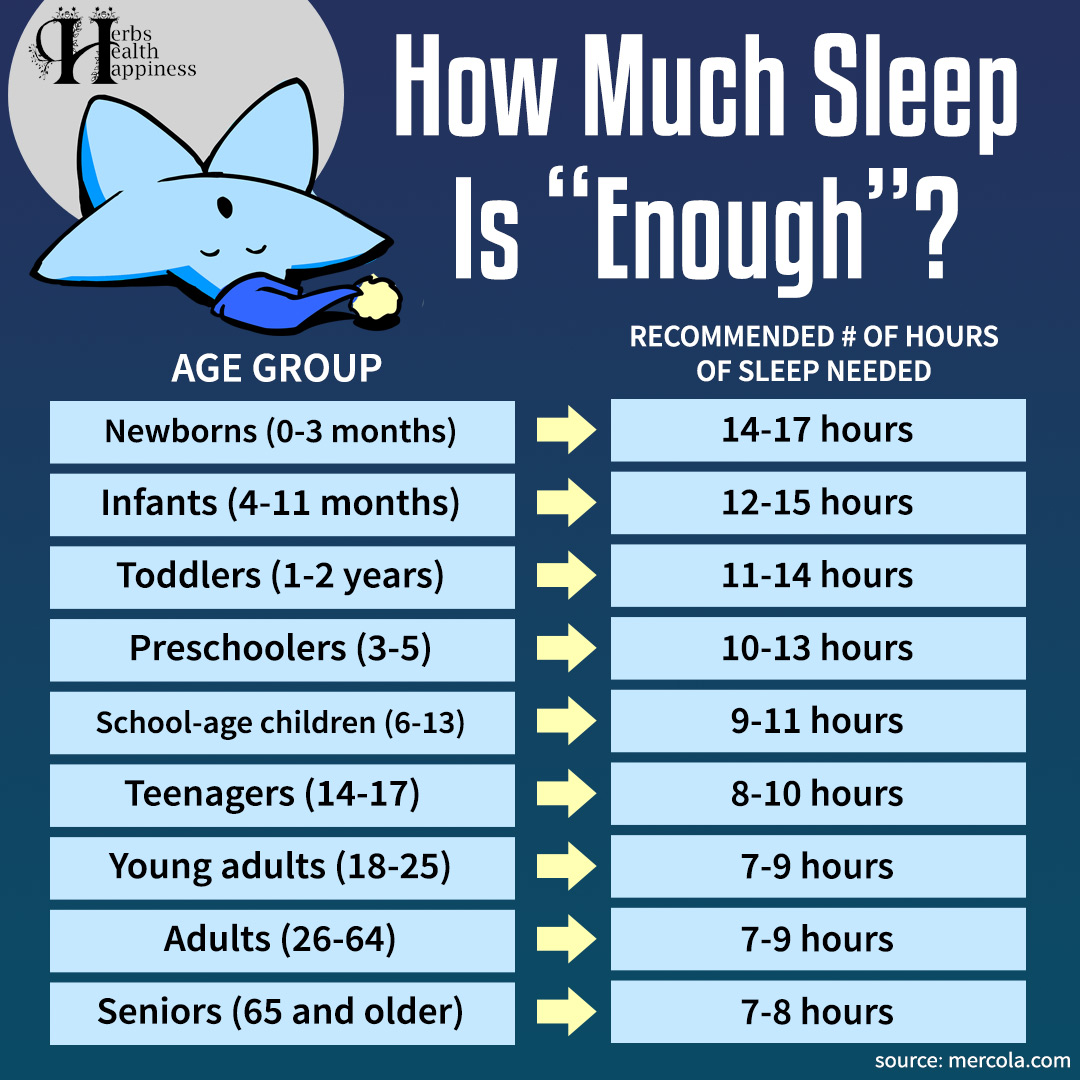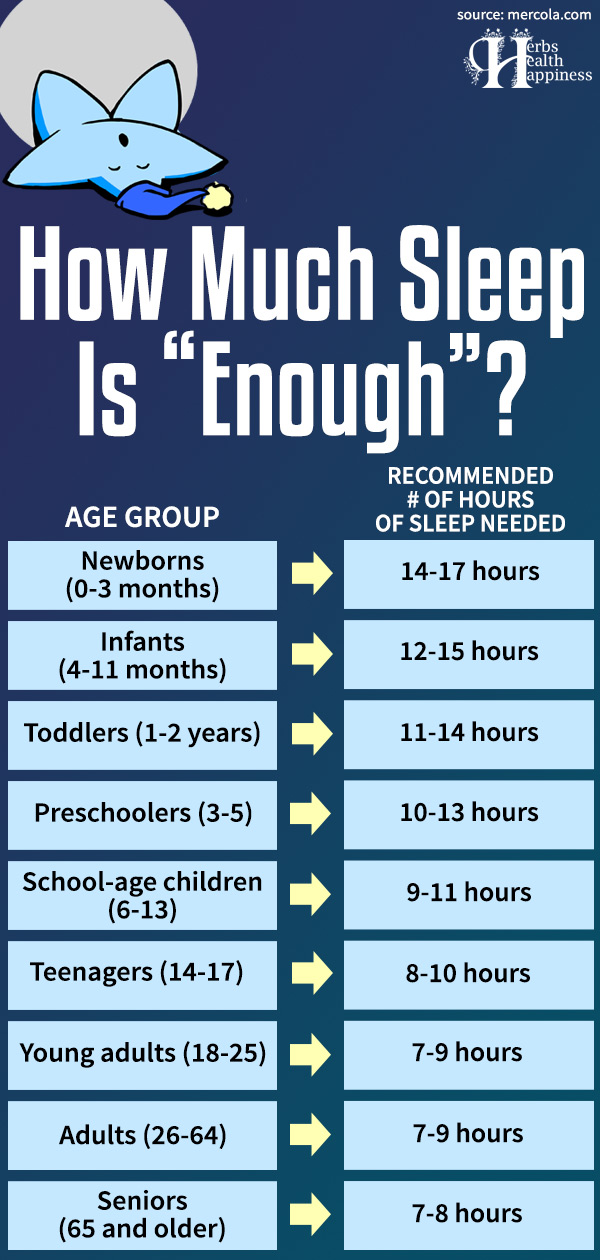Please follow us on Telegram to be sure to receive our latest posts!

Graphic: © herbs-info.com. Image source – Pixabay (PD).
Sleep is more than just a time when our body and mind shut down. It’s an active period of restoration, consolidation of memory, and strengthening. But what’s the risk of sacrificing a few hours every night to catch up on your favorite show or work late at night? Consider the following adverse effects of sleep deprivation:
⦁ Heart Disease and Stroke: According to a study published in the European Heart Journal, sleep duration is a significant predictor of cardiovascular outcomes. [1] Less than 7 hours of sleep every night increases the risk of heart disease and stroke.
⦁ Risk of Early Death: A 2010 meta-analysis claimed that inadequate sleep is associated with early death. [2]
⦁ Diabetes: Sleep below and above the recommended duration increases the risk of diabetes. [3]
⦁ Decline in Cognitive Function: According to a recent study, not getting enough sleep over a prolonged period leads to “impaired reasoning, problem-solving, and communication skills.” [4]
Recommended Sleeping Hours by Age Group
Different age groups have different health and lifestyle requirements – and this, in turn, affects an individual’s sleep needs. Consider these general guidelines from the National Sleep Foundation: [5]
⦁ Newborns (0-3 months): 14-17 hours
⦁ Infants (4-11 months): 12-15 hours
⦁ Toddlers (1-2 years): 11-14 hours
⦁ Pre-schoolers (3-5): 10-13 hours
⦁ School-age children (6-13): 9-11 hours
⦁ Teenagers (14-17): 8-10 hours
⦁ Younger adults (18-25): 7-9 hours
⦁ Adults (26-64): 7-9 hours
⦁ Older adults (65+): 7-8 hours
Final Remarks
To improve your health, it’s about time you start paying attention to your sleep patterns and make sleep a daily priority. You can even add sleep to your to-do list or your mandatory daily schedule. PS: Having “enough” sleep is not about being sleep deprived and compensating by logging many hours. Healthy sleep habits involve consistent routines to meet our sleep needs daily.
Please note that this content should never be used as a substitute for direct medical advice from your doctor or other qualified clinicians.
[1] Cappuccio, F. P. et al. 2011. Sleep duration predicts cardiovascular outcomes: a systematic review and meta-analysis of prospective studies. https://www.ncbi.nlm.nih.gov/pubmed/21300732.
[2] Cappuccio, F. P. et al. 2010. Sleep Duration and All-Cause Mortality: A Systematic Review and Meta-Analysis of Prospective Studies https://www.ncbi.nlm.nih.gov/pmc/articles/PMC2864873/.
[3] Gottlieb, D. J. et al. 2005. Association of Sleep Time With Diabetes Mellitus and Impaired Glucose Tolerance https://jamanetwork.com/journals/jamainternalmedicine/fullarticle/486518.
[4] Wild, C. J. et al. 2018. Dissociable effects of self-reported daily sleep duration on high-level cognitive abilities https://academic.oup.com/sleep/article/41/12/zsy182/5096067.
[5] Hirshkowitz, M. et al. 2015. National Sleep Foundation’s sleep time duration recommendations: methodology and results summary https://www.sleephealthjournal.org/article/S2352-7218%2815%2900015-7/fulltext.
Image For Pinterest:

Graphic ©herbs-info.com. Image source – Pixabay (PD).
😳 What Tinnitus Does To Your Brain Cells (And How To Stop It)
After 47 years of studies and countless brain scans done on more than 2,400 tinnitus patients, scientists at the MIT Institute found that in a shocking 96% of cases, tinnitus was actually shrinking their brain cells.
As it turns out, tinnitus and brain health are strongly linked.
Even more interesting: The reason why top army officials are not deaf after decades of hearing machine guns, bombs going off and helicopter noises…
Is because they are using something called "the wire method", a simple protocol inspired by a classified surgery on deaf people from the 1950s...
★ How To Get Rid Of Nail Fungus:
★ Does Your Salad Contain This Vegetable?
★ 20 Natural Painkillers In Your Kitchen (Video):
★ Men's Prostate Health:

2. Famous Chef Sheds 60lbs Researching New Paleo Recipes: Get The Cookbook FREE Here
3. #1 muscle that eliminates joint and back pain, anxiety and looking fat
4. 7 odd foods that KILL your abdominal fat (surprising fat-fighters)
5. The TRUTH about bread (Will surprise you!)
6. [PROOF] Reverse Diabetes with a "Pancreas Jumpstart"
7. Here's What Happens When You "Unlock Your Hip Flexors"
8. The #1 WORST food that CAUSES Faster Aging (beware -- Are you eating this?)
The #1 Muscle That Eliminates Joint And Back Pain, Anxiety And Looking Fat
By Mike Westerdal CPT
Can you guess which muscle in your body is the #1 muscle that eliminates joint and back pain, anxiety and looking fat?
This is especially important if you spend a significant amount of time sitting every day (I do, and this really affects me in a big way!)
Working this "hidden survival muscle" that most people are simply not training because no-one ever taught them how will boost your body shape, energy levels, immune system, sexual function, strength and athletic performance when unlocked.
If this "hidden" most powerful primal muscle is healthy, we are healthy.
Is it...
a) Abs
b) Chest
c) Glutes
d) Hip Flexors
Take the quiz above and see if you got the correct answer!
P.S. Make sure you check out this page to get to know the 10 simple moves that will bring vitality back into your life:
If you enjoyed this page:












